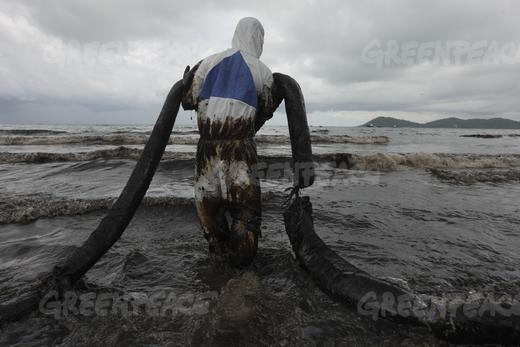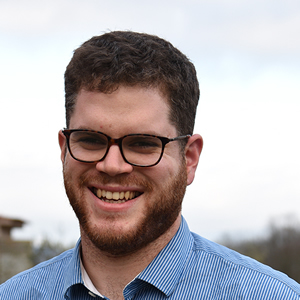Moving nimbly and strategically — fast feet! — is a crucial part of effective campaigning. It’s something Greenpeace already does — and something we must do more of to win bigger in the future. The “responsiveness roundup” will tell the story of just a few of the campaigns from the past weeks where fast feet played a crucial role.
Got more campaigns we’re missing, or ones from other organizations? Let us know in the comments!
Thai Oil Spill
Just a couple week ago, an oil platform in the Gulf of Thailand spilled an estimated 50,000 liters of oil in these vital waters. Greenpeace South East Asia moved quickly to draw attention to the spill by sending people to bear witness to the disaster, and to mobilise people to make some good come of it. Specifically, they launched a petition to make sure the specific actors at fault would be held accountable, but also to try and make sure that this would help catalyze movement toward the renewable energy sources that already exist today.
Using the crisis not just to draw attention generally but also to directly draw the thread from the spill to something GP SEA is working on (their Renewable Energy campaign), was a great example of how to make the most of a disruptive moment.
This effort is still underway — take action to be a part of this campaign.
Google’s funding climate deniers?
Google’s record on climate issues is pretty good, but then news broke a few weeks ago that they were hosting a fundraiser for Jim Inhofe, a US Senator who has been one of the most outspoken climate deniers in the country.
This is pretty egregious, and since the news broke, Greenpeace US has been working to raise awareness of Google’s bad behaviour here, protesting the fundraiser itself, generating bad press for Google because of its involvement with people like inhofe, and increasing support for the Forecast the Facts push against them — and Google’s internal scientists have already spoken out condemning their activity with Inhofe.
This is an ongoing effort, but Google now knows that even if they’re making clean energy investments, they’ll get serious scrutiny if they continue to fund climate deniers.
Singapore Haze

The slash and burn techniques used to clear forests in Indonesia have caused massive air pollution for a long time, and it got particularly egregious in the last couple of months. But there was a wrinkle: the winds were directing the smoke straight to nearby Singapore and Malaysia — where several of the companies involved in the slash and burning were actually based, and where a lot more media attention could be focused.
Singaporeans were taking to twitter to complain about the record pollution, sharing stories, jokes and complaints using the hashtag #sghaze.
Spotting this, Greenpeace South East Asia (GPSEA) and Greenpeace International (GPI) began highlighting pictures from Singapore and the forest fires under the same hashtag, and began directing attention at the guilty companies.
Where before that intervention the conversation had been centred on the responsibility of the Indonesian government to just stop the fires, fast thinking from Greenpeace and its supporters was able to steer it towards the guilty companies, and create outrage in Singapore and Malaysia about this.
Moving quickly and bringing wide eyes and open ears to the crisis made it so that the overall conversation could be changed, and anger and blame targeted at the actual culprits.
Thanks to Juliette Hauville for helping write the section on the Singapore Haze response.



